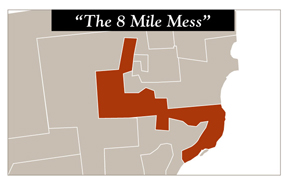Every ten years, the Michigan legislature has an opportunity, after assessing the results of the federal census, to redraw congressional districts to reflect shifts in population. The most recent redrawing of lines took place in 2011, and was approved by the Department of Justice in January, 2012, despite concerns that redrawn districts violated the Voting Rights Act by splitting some communities, like the Latino community of Southwest Detroit, and consolidating others. The intention of those Republicans who did the redistricting, civil rights activists claim, is clear… to keep liberal minority candidates from office when possible, and, in cases where that’s not possible, creating districts that are uniformly black, Democratic, etc., in hopes of limiting the number of individuals from that group reaching elected office.
 Gerrymandering, of course, is nothing new. Parties in power have always moved lines in order to protect and strengthen seats. The practice, however, has turned comical in the hands of Michigan’s Republican legislature, which has overseen our last two redistricting campaigns. (According to Blogging for Michigan, the most recent maps “were drawn by a member of the House Republican Campaign Committee, in charge of getting Republicans elected to the House, and the former Executive Director of the Michigan Republican Party.“) Take, for instance, Michgian’s new 14th district (seen above), which was named one of the “Top Five Ugliest Districts” by Roll Call. “Republicans went to great lengths to pack as many minority and Democratic voters into this downtown Detroit district,” said the Capital Hill publication, in an attempt to force Democratic Representatives Hansen Clarke and Gary Peters, both of whom used to have districts of their own, to fight to the death. (Peters beat Clarke in the Democratic primary.) The move eliminated a strong Democratic incumbent, and carved out democratic population centers from the surrounding suburban districts, making them more likely to be safe for Republican candiates in perpetuity.
Gerrymandering, of course, is nothing new. Parties in power have always moved lines in order to protect and strengthen seats. The practice, however, has turned comical in the hands of Michigan’s Republican legislature, which has overseen our last two redistricting campaigns. (According to Blogging for Michigan, the most recent maps “were drawn by a member of the House Republican Campaign Committee, in charge of getting Republicans elected to the House, and the former Executive Director of the Michigan Republican Party.“) Take, for instance, Michgian’s new 14th district (seen above), which was named one of the “Top Five Ugliest Districts” by Roll Call. “Republicans went to great lengths to pack as many minority and Democratic voters into this downtown Detroit district,” said the Capital Hill publication, in an attempt to force Democratic Representatives Hansen Clarke and Gary Peters, both of whom used to have districts of their own, to fight to the death. (Peters beat Clarke in the Democratic primary.) The move eliminated a strong Democratic incumbent, and carved out democratic population centers from the surrounding suburban districts, making them more likely to be safe for Republican candiates in perpetuity.
And, as you might imagine, this has very real implications at the polls. In the last election, according to the New York Times, “Republicans (in Michigan) lost some seats (but) were able to keep their majority with 54 percent of the seats in the state’s House of Representatives, while getting just 45 percent of the popular vote.” The article goes on to say, “In the nation as a whole, Democratic candidates for Congress won 1.1 million more votes than Republicans, according to a tally of the popular vote kept by David Wasserman, the House editor of The Cook Political Report. But Republicans maintained their control of the House — making this one of a handful of elections in the last century where the party that won the popular vote for Congress did not win control of the House.” So, to put it another way, because of the tactical, politically-motivated redrawing of congressional lines, winning a majority of the popular vote no longer translates to control of the House. In fact, calculations done by our friends at Think Progress seem to indicate that Democrats would need to win the popular vote by over 7% to win back the House of Representatives. Here’s a clip:
…The upshot of this is that if Democrats across the country had performed six percentage points better than they actually did last November, they still would have barely missed capturing a majority in the House of Representatives. In order to take control of the House, Democrats would have needed to win the 2012 election by 7.25 percentage points. That’s significantly more than the Republican margin of victory in the 2010 GOP wave election (6.6 percent), and only slightly less than the margin of victory in the 2006 Democratic wave election (7.9 percent). If Democrats had won in 2012 by the same commanding 7.9 percent margin they achieved in 2006, they would still only have a bare 220-215 seat majority in the incoming House, assuming that these additional votes were distributed evenly throughout the country. That’s how powerful the GOP’s gerrymandered maps are; Democrats can win a Congressional election by nearly 8 points and still barely capture the House…
And, to those of you out there who are saying that the Democrats do it too, I’d suggest that you check out the research of Princeton researcher Sam Wang, who has found that it’s the Republicans, by far, who are winning out in the fight to manipulate election results by means of redistricting. In fact, Wang’s research has shown that, while some 4.4 million voters were disenfranchised as a result of partisan-controlled redistricting in the last election, Democrats were disenfranchised more than Republicans at a ratio of 10:1. So, while Democrats have been known to do it, they don’t do it at nearly the same level.
It’s clearly something that we, as a country, need to deal with. U.S. Attorney General Eric Holder, said as much a few weeks ago, when he spoke on the Voting Rights Act at the Kennedy School of Government. “We should consider reforms to the redistricting process for state and federal offices,” said Holder, “so districts are drawn in a way that’s neutral, that promotes fair and effective representation for all, and that can’t be abused to protect incumbents and undercut electoral competition.” I’m not sure what the feds can do, as the individual states, I’m sure, would put up one hell of a fight if the Obama administration tried to enforce nation-wide redistricting standards, but, as the conservative majority on the Supreme Court has repeatedly refused to hear gerrymandering cases, I’m not sure what other options are available to us. Of course, if we wanted to, the people of Michigan could take it upon ourselves, and pass a ballot initiative, like the people of California did in 2008, when they passed the Voters FIRST Act… The following background comes from Wikipedia:
Proposition 11 of 2008 (or the Voters FIRST Act) was a law enacted by California voters that placed the power to draw electoral boundaries for State Assembly and State Senate districts in a Citizens Redistricting Commission, as opposed to the State Legislature. To do this the Act amended both the Constitution of California and the Government Code. The law was proposed by means of the initiative process and was put to voters as part of the November 4, 2008 state elections. In 2010, voters passed Proposition 20, which extended the Citizen Redistricting Commission’s power to draw electoral boundaries to include U.S. House seats as well.
I don’t want to go into too much detail about how they’re doing it in California, but, before we move on, I think it’s important to note that, as California’s elected officials have a say as to who serves on the Citizen Redistricting Commission, there are still politics at play. The following explanation as to how Commissioners are chosen, comes from the Commission’s website.
In accordance with the Voters FIRST Act (Act), the California State Auditor randomly selected the first eight members of the first Citizens Redistricting Commission (Commission) on November 18, 2010. These first eight commissioners—three who are Democrats, three who are Republican, and two who are either Decline-to-State or are registered with another party—were part of the 36 eligible applicants that remained in the sub-pools after the legislative leaders, exercised their authority to make strikes and eliminated the names of 24 applicants from the pool of 60 of the most qualified applicants identified on September 23, 2010 by the Auditor’s Applicant Review Panel (Panel). The Panel reviewed and evaluated the applicants based on criteria set forth by the Act approved by voters in November 2008; including relevant analytical skills, the ability to be impartial; and a demonstrated appreciation for California’s diverse demographics and geography.
So, while it’s not exactly a perfect solution, devoid of any political gamesmanship, it still seems as though a system such as this would be an incredible improvement over the current system in Michigan, which allows the majority party to, with very few exceptions, do whatever they want. And “what they want” could, I’m afraid, extend beyond the rigging House elections by way of gerrymandering. As Rachel Maddow mentioned not too long ago, there seems to be a movement afoot in Michigan (as well as in Ohio, Pennsylvania, and Virginia) to transition away from a winner-take-all electoral vote system, to one which awards electoral votes in the presidential election from each of these gerrymandered congressional districts independently. Here’s video.
Visit NBCNews.com for breaking news, world news, and news about the economy
Visit NBCNews.com for breaking news, world news, and news about the economy
Maddow, toward the end of the second video, for those of you who didn’t watch it, says that she wouldn’t have thought it possible that Michigan would even consider doing such a thing, if she hadn’t seen how Republicans crammed through right-to-work legislation during our most recent lame duck session. “If they’re willing to take the cradle of American union rights, and just ram it though,” said Maddow, “with no debate… ‘We’re announcing it on Thursday, it’s done my Thursday night. Screw you, state. Screw you. We don’t want to hear about it. We’ll deal with the consequences when we have to.’ To take that approach to right-to-work is why I’m talking about this potential proposal from Michigan now, because now anything seems possible.”
Romney, by the way, would have won the presidency, in spite of losing the popular vote, if all 50 states awarded their electoral votes by congressional district, as it deemphasizes to a great extent the voters in larger cities, who are predominantly liberal.
 As for redistricting, while I like the idea of handing the task off to a non-pratisan group, I think I’m more inclined to say that we should give the job to a piece of software running an un-biased split-line algorithm like the one developed by The Center for Range Voting. (Their suggestion for a fairly redistricted Michigan can be seen to the right.) I realize that doing it in this way might miss some subtle nuances and historically significant boundaries, but could it really be any worse than what we have today?
As for redistricting, while I like the idea of handing the task off to a non-pratisan group, I think I’m more inclined to say that we should give the job to a piece of software running an un-biased split-line algorithm like the one developed by The Center for Range Voting. (Their suggestion for a fairly redistricted Michigan can be seen to the right.) I realize that doing it in this way might miss some subtle nuances and historically significant boundaries, but could it really be any worse than what we have today?
The ultimate answer, I suspect, is somewhere in the middle, with appointed, non-partisan commissioners working with sophisticated open-source mapping tools, tweaking the automated results as necessary. The important thing is that we start the conversation now, though, before the Republicans in Lansing decide to further entrench the current system by making it the basis for how we allot our electoral votes.
update: It looks as though a coalition of various interested parties in Michigan is already pushing for redistricting reform. The group, called The Michigan Redistricting Collaborative, lays out its plan like this:
The Michigan Redistricting Collaborative has a plan for more openness:
1. The Michigan Redistricting Collaborative supports legislation that would, for congressional and state legislative redistricting:
a. Require redistricting plans to be available on the Legislature’s web site for 30 days before passage.
b. That each chamber be required to hold at least two committee meetings to receive testimony about the plan.
c. That the Legislature hold at least four public hearings around the state to allow direct comment by the public.
d. That the Legislature provide a statement for each district explaining how the boundaries were drawn and how the district has been changed.
2. Other states already are taking the lead in this matter, and giving the people a bigger say in redistricting. Iowa and about nine others have taken steps to reduce partisan legislative redistricting. Now it’s time for Michigan to take that step.












17 Comments
Exactly this. This is why we have a Santa impersonator with rage issues representing my district right now instead of Syed Taj.
There’s so much that needs to be done, it’s hard to know where to begin. It’s paralyzing.
From Mother Jones:
“Who Gerrymanders More, Democrats or Republicans?”
Read more:
http://www.motherjones.com/kevin-drum/2013/01/who-gerrymanders-more-democrats-or-republicans?1
I strongly support redistricting reform, preferably through creating an independent commission. Because the Michigan Redistricting Collaborative’s plan leaves redistricting in the hands of the legislature, I don’t think that it would produce the non-partisan redistricting process we need.
While gerrymandering is a real problem, it doesn’t account for all of the Republican advantage in state and Federal elections. The other major problem is that Democrats tend to be concentrated in cities, leaving Republican majorities in suburban and rural areas. As a result, Democrats win urban districts by large margins, while Republicans tend to win a larger number of districts, usually by smaller margins. Kevin Drum provides a good overview of the problem:
http://www.motherjones.com/kevin-drum/2012/11/gerrymandering-not-big-deal-you-think
http://www.motherjones.com/kevin-drum/2012/11/gerrymander-effect-take-2
As a result of our system of single-member districts, most districts are now safe for one party or the other. This situation leaves many voters without effective representation and it fuels ideological polarization in Congress and in state legislatures. I don’t see a solution without adoption of some form of proportional representation. FairVote is one group advocating for this kind of reform:
http://www.fairvote.org/
What happens when all the blue states do the right thing, and pass legislation to restrict gerrymandering, making elections fairer, and all of the red states continue on the current path? While I agree that reform is necessary, I think it has to be a concerted nationwide effort. It won’t work if just the Democrats agree to play fair.
If Michigan had, during the last election, awarded its electoral votes by congressional district, what would the split have been?
http://www.democraticunderground.com/10021776592
If they were good at gerrymandering, they would have followed the county lines.
After posting this, I wrote to various elected officials. The first one to respond was State Senator Rebekah Warren, who just sent the following.
http://www.newyorker.com/online/blogs/comment/2013/01/ending-gerrymandering-and-building-a-better-democracy.html
The Republicans are acknowledging that this is why they kept the House.
Read more:
http://tpmdc.talkingpointsmemo.com/2013/01/gop-memo-gerrymandering-house-majority.php?ref=fpb
I want to bring your attention to Elections Canada, the independent, non-partisan group in Canada that oversees redistricting, elections, etc. You can read more about them at Wikipedia.
http://en.wikipedia.org/wiki/Elections_Canada
It’s astonishing to me that the United States doesn’t have an equivalent.
From Wikipedia:
“Elections Canada (Élections Canada in French) is an independent, non-partisan agency reporting directly to the Parliament of Canada. Its ongoing responsibility is to ensure that Canadians can exercise their choices in federal elections and referenda through an open and impartial process. Elections Canada is the sole agency responsible for administering Canadian federal elections.”
I’m not going to sit and yell at the TV anymore. I can barely walk but I intend to stand up, walk to, march and protest the cheating these lowdown dispicable Republicans are pulling. All Dems need to heed the warning of what iles ahead with Gerrymandering
I was about to go out and riot, but then I came across some photos of dogs wearing pantyhose.
http://laughingsquid.com/dogs-wearing-pantyhose-a-popular-new-meme-in-china/
If you thought gerrymandering was bad before, just wait and see what happens now that the Voting Rights Act is gone.
How did I not know about this blog until today? What you have created here it truly magical.
The Michigan Supreme Court actually did the right thing. The GOP is livid. They absolutely hate it when judges make decisions properly, instead of serving their party. They’re super patriotic that way.
4 Trackbacks
[…] Gerrymandering in Michigan: Can this state get more ridiculous? (Mark Maynard) 2. We’re way overdue for an increase in the minimum wage. I know a lot of small businesses […]
[…] legislature cramming all of this stuff into a lame duck session was very, very bad.”I know we’ve been talking a lot about gerrymandering lately, and how imperative it is that we change the way that redistricting is done in Michigan, to ensure […]
[…] next Presidential election, and Michigan’s roleBy Mark | January 24, 2013A week or so ago, in a post about partisan redistricting, I noted that rumors were circulating concerning a Republican push to change the way […]
[…] [Background on Michigan’s gerrymandering problem can be found here.] […]